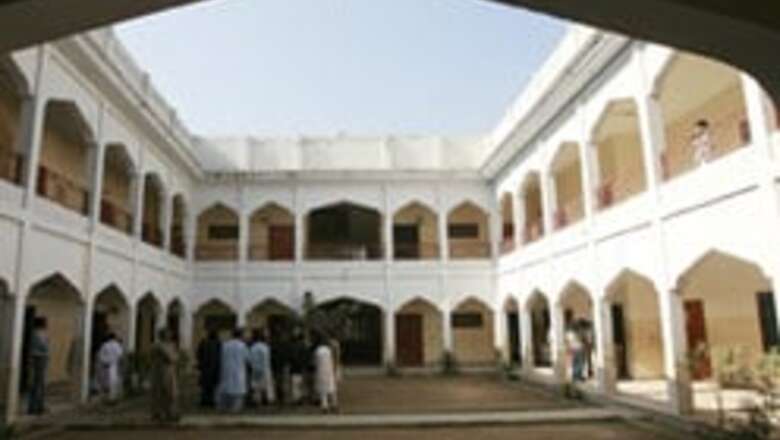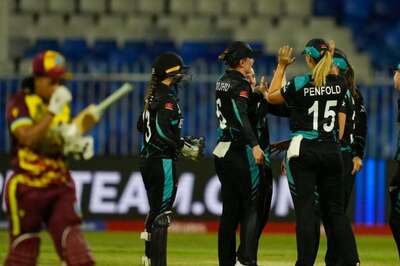
views
Islamabad: One of the suspected planners of last month's attack by terrorists in Mumbai was arrested by Pakistani security forces in a raid on a militant camp near Muzaffarabad, sources in the capital of Pakistani Kashmir said on Monday.
The Pakistani government has so far been silent over Sunday's raid at the camp used by Lashkar-e-Toeba fighters in the hills outside Muzaffarabad, but a spokesman for the jihadi group confirmed it had been targeted.
"Pakistani forces have attacked our camps in Muzaraffabad under pressure from the US and India. We repeat that Laskhar-e-Toeba has nothing to do with the Mumbai attacks," Abdullah Ghaznavi, a spokesman for Lashkar, told Reuters in a satellite telephone call.
India and the United States have pressed Pakistan to act against terrorists suspected of being behind the attacks, which killed at least 171 people, or risk an escalation in tensions between the two countries.
Intelligence officials, workers with a charity linked to Lashkar and people living nearby say the area around the camp was sealed off before security forces moved in to make arrests.
An official with the Jamaat-ud-Dawa charity said Zaki-ur-Rehman Lakhvi, a Lashkar operations chief named by India as a suspect in the terror strike, was taken into custody.
"Yes, Lakhvi is among four or five people arrested in a raid yesterday," said the official, whose JuD charity is regarded as a front for the feared militant group.
A former terrorist who now has close ties to the JuD also said Lakhvi had been arrested, as did one intelligence official.
All of them were speaking on condition of anonymity because of the sensitivity of talking about security matters. Other Pakistani intelligence officers said six men were arrested, but gave no names.
The surviving terrorist captured in Mumbai named Lakhvi and another Lashkar commander, Yusuf Muzammil, as ringleaders in the plot, according to Indian officials.
Indian police said they had identified the nine dead terrorists, and the places they came from in Pakistan.
Rakesh Maria, the lead investigator for Mumbai police, said three suspects including one in custody were from Okara district, three from Multan, two from Faisalbad, one from Sialkot and he identified the leader as Ismail Khan, from Dera Ismail Khan.
They were also questioning a man arrested in northern India last February, and investigating if there were any links to homegrown Islamist militant groups.
The man being questioned is an Indian citizen who was caught with maps that highlighted several targets hit in Mumbai.
FRAUGHT RELATIONS
Pakistan has asked for proof that attackers came from its soil. It says it will cooperate with India in the investigation but tensions between the uneasy neighbours have risen.
For the past two days they have been arguing over the origin of a hoax call to Pakistani President Asif Ali Zardari on November 28 by someone pretending to be the Indian foreign minister.
The aggressive tone taken by the caller resulted in Pakistani forces going on high alert for almost 24 hours.
The Pakistan government issued a statement after a special meeting of the cabinet's defence committee saying it was "imperative to proactively defuse the prevailing tensions".
The United States has exerted diplomatic pressure on Pakistan to match words with deeds swiftly to stop the crisis worsening, while asking India to exercise restraint.
"I think there's no doubt that Pakistani territory was used, by probably non-state actors," US Secretary of State Condoleezza Rice told CNN's "Late Edition" on Sunday.
The United States fears a confrontation with India could deflect Pakistan from the war on terrorism.
If Lakhvi's arrest is officially confirmed, it will raise the question of what the Pakistani authorities will do with him, and whether it will satisfy India.
Zardari has said that anyone arrested in Pakistan will be tried there, too. The Pakistani military's Inter-Services Intelligence (ISI) agency had ties in the past with Lashkar and other jihadi organisations fighting Indian rule in Kashmir, according to analysts, which could reduce the Pakistani authorities' readiness to be transparent in its handling of the situation.
Laskhar was banned by Pakistan in 2001 after it was blamed, along with Jaish-e-Mohammad, for a raid on the Indian parliament that almost sparked a fourth war between the two countries.
The JuD, however, was just put on a watch list, although the United States has branded the charity, which has thousands of followers, a terrorist organisation.
The Indian government's measured response so far contrasts with the tough action its public has called for.
The government, which faces a general election in 2009, has been criticised for security lapses in the wake of the attacks on Mumbai.
Yet Prime Minister Manmohan Singh's Congress party, despite general distress over rising inflation, looked set to fare far better than expected in elections underway in five states.
The latest crisis with Pakistan has weighed on investor confidence, already sapped by a slowing economy, but the Mumbai stock market rose on Monday thanks to rate cuts and a stimulus package announced at the weekend.



















Comments
0 comment